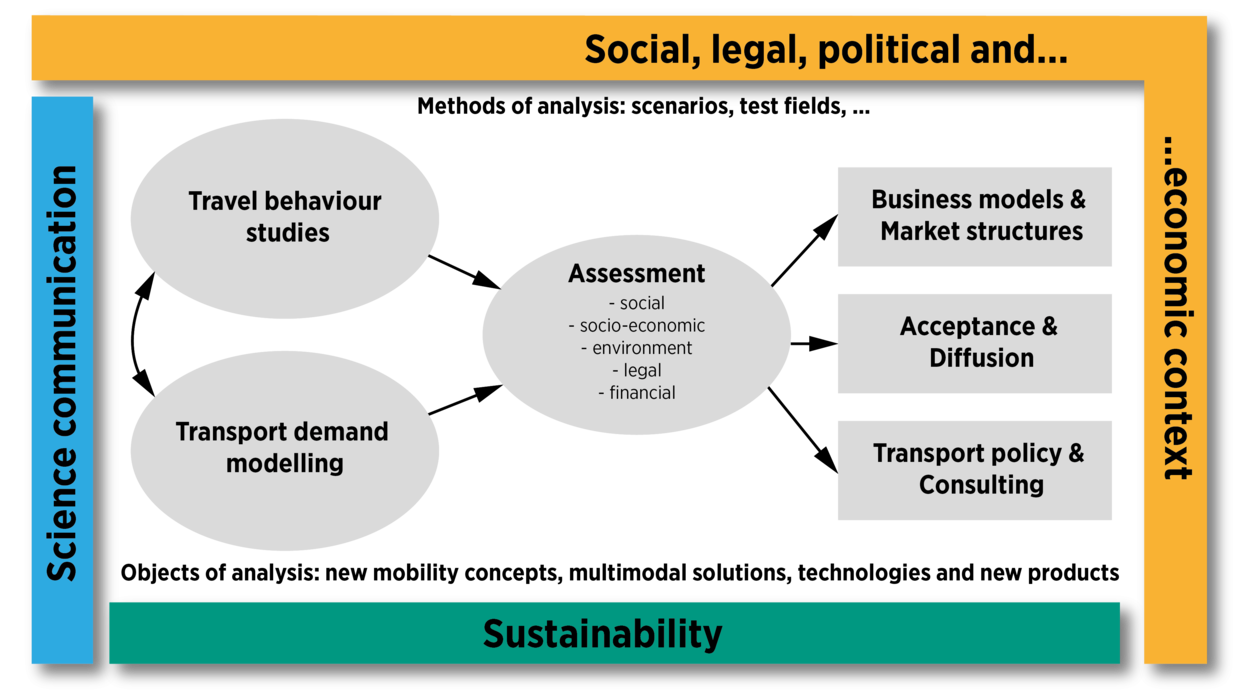Mobility and Society
Introduction
Research under this topic provides the societal, economic, political and legal context of mobility and transport. Thus the research covers travel behaviour studies, travel demand modelling at micro- and macroscopic level, the assessment of transport policies, business models and market structures, as well as the acceptance and diffusion of emerging mobility solutions. The topic also covers scientific communications.


Research is focused to support and develop new mobility concepts, multimodal solutions, technologies and new products which meet the requirements of all sustainability dimensions (social, economic, environmental).
The methods applied in this topic include the conduction and analysis of travel surveys, the development of transport demand models and other assessment instruments, the use of applied test field methods (“Reallabor”) and the development of multidimensional scenarios.
Research Focus
New mobility concepts and services
Research in this focus covers the development and analysis of mobility innovations for passenger and freight transport at urban, regional, national and European scale. The analyses embrace estimations of behavior and demand, the development of business models, the assessment of environmental, social and economic impacts, the evaluation of their spatial impacts, the implications on urban planning, as well as legal aspects.
Sustainability
This research addresses the assessment of sustainability of transport policies, regulatory frameworks and innovative mobility concepts and services, and the development of sustainable transport solutions. Sustainability is regarded according to its three dimensions environmental, societal and economic.
Multimodality
Research aims at providing the organizational, economic and regulatory basis for seamless mobility for passenger and freight transport. Multimodality covers all modes of transport (both long-distance and short-distance), with special focus on the first/last-mile of a transport chain and optimizing the modal interface between long-distance and urban modes.
Travel demand modelling
Develop and improve travel demand models as tools for transport planning and to analyze the impacts of innovative mobility concept. The focus is estimating decision models in agent-based travel demand models using data from surveys and field observations.
Associated Institutes
ECON - Institute of Economics
IESL-ISTB - Institute for Urban and Landscape Design - Devision for International Urban Development and Design
IFAB - Institute for Human and Industrial Engineering
IFGG - Institute of Geography and Geoecology
IFL - Institute for Materials Handling and Logistics
IFKM - Institute for Piston Engines
IFV - Institute for Transport Studies
IIP - Institute for Industrial Production
IPEK - Institute of Product Engineering
ITAS - Institute for Technology Assessment and Systems Analysis
SZS - Study Centre for the Visually Impaired Students
Interfaces
-
to other Topics within the KIT Mobility Systems Center, especially
-
to other KIT Centers, in particular
-
AARTI - Academy for Responsible Research, Teaching, and Innovation
-
CEDIM - Center for Disaster Management and Risk Reduction Technology
-
TransportNET (external)
